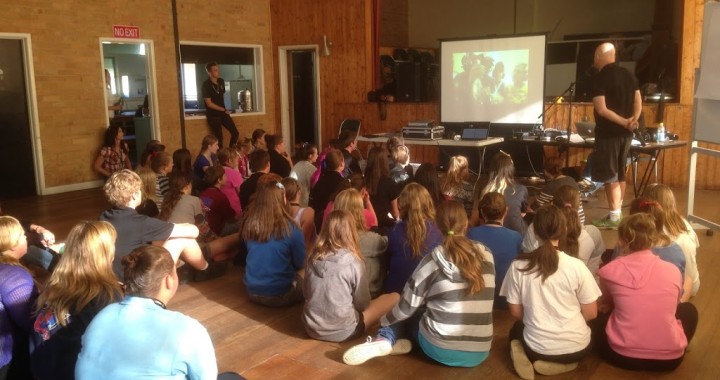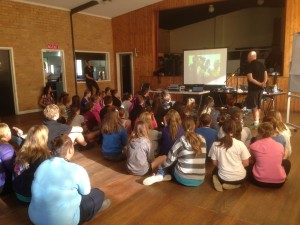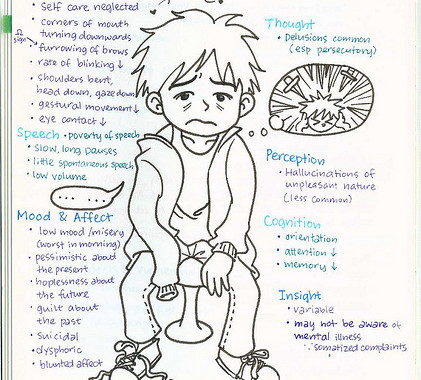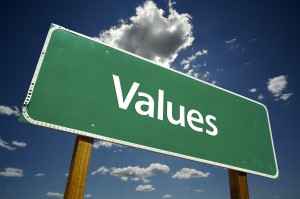Tag Archives: Multi-Disciplinary
Last week we spoke about the need for youth workers in the education system to have good relationships. This week we look at the need for a good understanding of theory…youth work and educational.
In youth work we study youth development, theories of participation and many others that help us to work with young people in every situation we find ourselves in. Our theories often focus on the strengths of our young people to overcome the adversities they face. We develop our working styles around the strengths of our young people to provide a solid foundation to build relationship and work towards the future. Teachers also use their theory base to work on developing young people.
One of the most common theories that teachers use is called scaffolding. Scaffolding was developed by Russian Psychologist Lev Vygotsky in the early years of last century. Vygotsky believed that all understanding is built on the previous learnings of a person. That a process must be undertaken to build new knowledge on top of old knowledge in the same way we build a scaffold. Vygotsky also believed in the Zone of Proximal Development. A space between what a young person can do by themselves and what they could do with the help of an adult. These two theories have permeated educational systems throughout the world for over forty years.
Another theorist who has permeated the education system is Ivan Ilich, an Austrian philosopher, Roman Catholic priest, and social commentator on areas such as medicine and education. In 1971 his book “Deschooling Society” gave a radical slap in the face to institutional education and how it has has limited the learnings of young people in society. Instead he posits self-directed learning as a better option.
A number of other theories permeate the education system and depending on where in the world you are will depend on the theory that is at the forefront of educational practice. Using the relationships you have made ask a teacher or principal to give you an overview of the theoretical approaches that they use. If you have an understanding of the theories which underpin their work then you can work with them to develop a model of practice in their school which works for both parties.
What theories do your schools use?
one in four young people will have a diagnosed mental illness: do you know the signs?
One in four young people will have a diagnosed mental illness in their lifetime. That means one in four young people you come across probably has symptoms of the troubles brewing right before your eyes. As youth workers our training in mental health is limited at best. If oour training is limited then we are severely limited in our ability to support them. Over the coming weeks we will look at a great tool for identifying issues early in a young person… and we all know that early detection leads to the best outcomes for our young people.
One of the best tools I have come across over the years is a Mental State Exam. As a your worker I was initially weary of using another form that put my young people in a “clinical” box. However, as I have used this tool and become more familiar with it I have found that I am able to see minute change in my young people which help me identify potential mental health issues. If you can see the changes early it helps you to support them to get the help they will need.
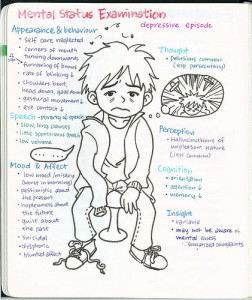 The Mental State Exam covers eight areas of the person for us to keep an eye on:
The Mental State Exam covers eight areas of the person for us to keep an eye on:
Over the coming weeks we will show you how to complete a Mental State Exam, What to look out for and when to refer on to the proper treatment. They are a tool, and like any tool it takes practice to master. That is why we will look at one area per week until we have a good understanding. When we have a good understanding then we can put it in the toolbox and use it when the need arises.
In the meantime here is a short video to whet your whistle.
What is a youth workers Duty of Care: Reporting abuse
Over the past few weeks I seem to have had a number of people ask about ethical practice and duty of care in youth work. Many of these discussions have come about from grey situations arising or where multi-disciplinary teams where at work. I have been asked this question by young and old, qualified and unqualified, veteran and newbie from youth worker’s all over the globe. What this question really boils down to is what is my ethical duty when something happens that I believe is morally questionable??? The short answer is it depends on a number of factors!
Know your legal responsibility.
Here in Australia we have a number of different legislations in different states which cover the discussion of a youth worker’s ethical duty of care and legal responsibilities to report abuses when supporting young people. Some are very stringent and others do not require youth workers to do anything. In the Australian Capital Territory, New South Wales, Queensland, South Australia and Tasmania the legislation’s are fairly robust and clear about the requirements required of people in a youth work position. In the Northern Territory they have a very broad definition of who is mandated to report by saying “any person with reasonable grounds”. In Western Australia a very clear list of professionals is listed however youth workers are not required to report. In my home state of Victoria only doctors, nurses, principals of schools and teachers, and police officer are mandated to report abuse. Youth workers are listed in the legislation but not enacted as mandatory reporters.
Throughout the globe different countries require different actions from youth workers the best bet is to contact your local youth peak body or government department for clarification. What this means for each individual youth worker is a matter of legal interpretation and your own moral compass.
Know your own values.
Even though youth workers are not mandated to report abuse in Victoria The team here at Ultimate Youth Worker would argue that we have a moral requirement to report abuse to the authorities. But where does this lead??? What do we report on??? Abuse!!! Physical, Sexual, Emotional and Neglect. But this can lead to some difficulties with youth work theory and practice. What is the central theoretical framework for youth work practice? We would argue RELATIONSHIP. We know this is contentious and we will get some negative feedback, but we develop our RELATIONSHIP with young people as a means to support them as a whole person. But is the RELATIONSHIP more important than a young persons safety and protection from abuse???
What is OK? If a parent smacks their 13 year old is it reportable? What if it was with a belt? or a baseball bat? When does a smack turn to a beating? When does a beating become abuse? What about sex??? Is it OK for a young person to have sex? What about age differences? Is two years OK? What about four? How about 20? What if the young person is 12 and they are drunk? What if a young person tells you that they have to cook their own meals at home? What is they do everything? For a youth worker there is no black and white, there is only differing shades of grey.
When young people are navigating the storms and stresses of adolescence it is messy. For one young person in a particular situation a youth worker will act one way. For another, they will act completely differently. Professional discretion and practical wisdom are key to the practice of a youth worker who is not mandated to report abuse. All this being said it comes down to a judgement call. What does your gut tell you??? Is it OK for a father to beat their teen till they bleed? Is it OK for a 12 year old to have sex with a 16 year old? Is it OK for a young person to be left to their own devices because a parent is neglecting them? Your answer will determine your course of action.
Ask your colleagues.
Have a conversation with your colleagues around the issue at hand. Use your peer consultation network. Ask what they would do! Take their advice. Peer consultation, unlike a chat about the weekend around the water cooler, describes a process in which critical and supportive feedback on style and worker identity is emphasized while evaluation of practice is not. Consultation, in contrast to supervision, is characterized by the youth worker’s, “right to accept or reject the suggestions [of others]” (Bernard& amp; Goodyear, 1992, p. 103).
Call your local child protection office and ask for a secondary consultation. Ask them what your responsibility is and what you could do from there. Find online casino bonuses here. Use every network you have to discuss the issue and see what options are open to you.
What is my duty of care?
If you are not mandated it is really up to you! If your organisation doesn’t have a policy it is really up to you! If you have a reasonable belief that a young person is being abused it is really up to you! RELATIONSHIP is important, but never at the expense of the young persons safety.
We will continue to develop the idea of our duty of care as youth workers of the course of this blog. Reflect on your practice and that of others you have seen. If you have questions and you will (We still do) leave a comment below or get to us on the social networks.
